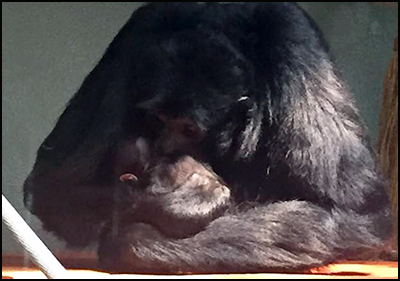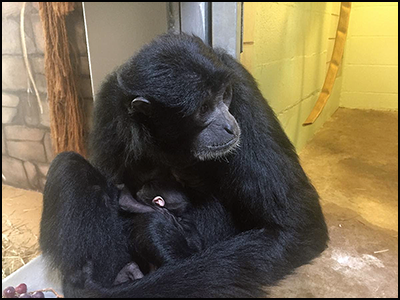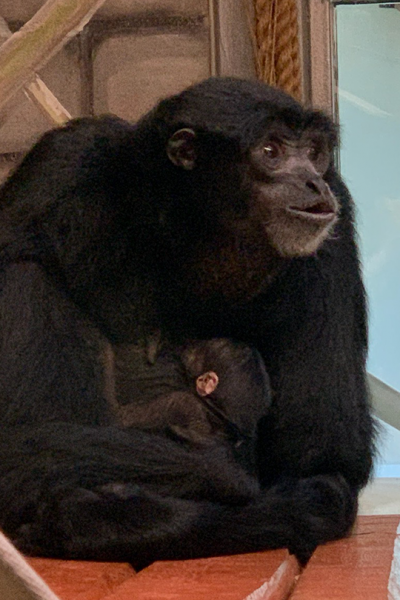Baby Siamang Born to First-Time Parents, Eve and Wayan – Eve, a 9-year-old Siamang at Cheyenne Mountain Zoo, took a different approach to Labor Day this year: by going into labor. In the wee hours of the morning, she gave birth to an adorable black-haired, pink-eared baby, whose sex has not yet been identified. Baby and mom seem to be doing well so far, and dad, Wayan, is curious and calm around baby. Their keepers, once they recovered from the happy surprise of discovering the baby this morning, have been monitoring the family of three, and see good signs from all.

“Eve and Wayan are normally spooning together when we come into work for early-morning checks,” said Kelsey Newman, keeper at CMZoo who doesn’t always work in Primate World, but was the first to see the baby Siamang. “This morning, I noticed they were sitting a little differently. Then, Wayan moved away from Eve and I saw the little baby’s arm. It was a surprise, for sure.”
Although Siamangs, a kind of gibbon, are endangered in the wild, Eve and Wayan did not have a breeding recommendation from the Gibbon Species Survival Plan. Because their different families’ genetics are well represented in Siamangs in human care, they weren’t currently recommended to breed, but those recommendations can change at any time. With that in mind, Eve has been on oral birth control. Just like humans, oral contraceptives are not 100% effective for apes. Siamangs don’t show signs of pregnancy as obviously as humans, so the birth did come as a surprise to keepers, but Eve seems to have embraced motherhood without skipping a beat.
“You can tell just by looking at Eve that she’s head over heels in love with that baby already,” said Joanna Husby, Primate World animal care manager. “She’s cradling her baby with both arms, licking its head and nuzzling it while it nurses. It’s really sweet.”

Husby describes Siamangs as the ‘romantic apes,’ because they’re the only ape species that mates for life in the wild. They have tight family bonds, and fathers play a big role in raising their babies, unlike many species of the animal kingdom. When mom Siamangs get sleepy, you’ll see the dads cuddling the babies while the moms rest.
“We’re already seeing great instincts in Wayan,” said Husby, who in addition to managing Primate World, is secretary of the Gibbon SSP and has worked directly with gibbons at CMZoo for 12 years. “He’s sticking close by without interfering. He’s really curious and is being respectful, showing support without taking over.”
While the baby bonds with its new parents, it’s important they have access to a quiet, private space. In addition to their indoor on-exhibit areas, they have access to multiple behind-the-scenes dens. Depending on weather and the baby’s development, the family will also have access to their outdoor space. The gibbons may be visible to guests in Primate World, depending on where they prefer to spend time.
There are no plans to name the baby, yet. Stay tuned to the Zoo’s social media pages for more updates on this sweet little family.

